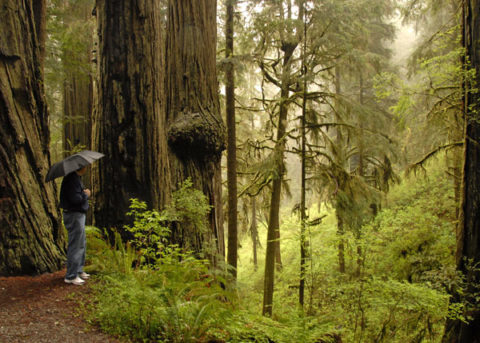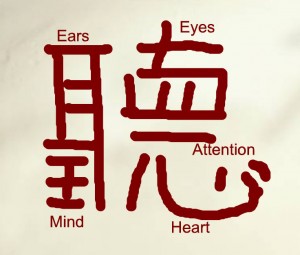For the next little while, I’m reposting content from my archive that I think is relevant for today. In 2012 I was doing a 365 day photo project on contemplative photography. I was very much focused on opening the senses and especially listening. This post highlights a podcast episode that is one of my very favourites, with acoustic ecologist Gordon Hempton. His story is inspiring. I think listening is crucial during this time of Covid-19 and the awareness of systemic racism.

Listen to the Silence
When my husband and I visited the giant redwood forests in northern California, it was awe-inspiring to see and experience the size and age of those trees. Although this particular area wasn’t remote – there was a road through the park – on this particular day it was pouring down rain, and the sounds were as amazing as the sights. There were few people driving through the park that day, so when we got out of the car, we could clearly hear the sounds of the forest, as well as the rain pouring down. It was an ecosystem of sight and sound and we were a part of it.
Listen in the Silence
I’m always talking about expanding the way we see or learning to see in new ways, that it is the meaning of life, yada yada yada. The word seeing implies using our eyes. But, I believe that listening plays an integral part in learning to see.
I started thinking more about this after hearing Krista Tippet’s On Being podcast/interview with Gordon Hempton, called The Last Quiet Places. Hempton is an acoustic ecologist, who has travelled the world collecting recordings of sound in some of the most remote places on earth. He sees silence or quiet as being endangered. For him, quiet is not an absence of sound, but an absence of noise.
“Quiet is a think tank of the soul.” ~ Gordon Hempton
His epiphany about sound came when he was a young adult. While taking a break from a long drive cross country, he stopped and lay in a field listening to a thunderstorm roll by and crickets chirping. Hempton realized that he had always thought of listening in terms of the people around him and was totally oblivious to other sounds. He was 27 years old and had never really listened before! From that day forward, Hempton’s goal was to become a better listener.
One of the most interesting segments from the interview was about learning to listen from a child. Hempton says that a lot of parents tell him that their children just don’t listen. Yet, in Hempton’s view, the focused attention taught in school is a form of “controlled impairment.” He advises taking a preschooler outside for a night walk. They will tell you everything there is to hear.
Noise pollution negatively affects our health.
Being bombarded by noise is jarring and affects our mood and relationship to a place. Hempton even says that studies show that in areas where there is a lot of noise pollution, people are not as nice to each other. I am lucky to have a wooded backyard that attracts birds and other wildlife. Working outside in my gazebo is mostly calming and relaxing, because I hear the sounds of the birds and the wind rustling through the trees. And then, suddenly the sounds of a riding lawnmower or leaf blower drowns out those sounds. There are times I have had to retreat inside because of the noise pollution.
Listen: Horizon at Dawn in the Midwest, recorded by Hempton (headphones highly recommended). It is a 4 minute meditative experience.
“The earth is a solar-powered jukebox.” ~ Gordon Hempton
How to Become a Better Listener

Kanji Listening
1. Practice Kanji listening with the people in your life. This means listening with your ears, eyes, heart, mind, and attention.
2. Take a night walk with a preschooler, as Gordon Hempton suggests (or by yourself, if no preschoolers are available). What do you hear?
3. Take a photo walk, paying particular attention to sounds as well as sights. How does it change your experience of what you see?
4. Take moments during your day, and listen to the sounds around you. How does noise pollution play a part and how does it make you feel?
5. If you’re lucky enough to live near a place with little noise pollution, go there, lay on the ground and take in the symphony of sound.
Do you have an experience of deep listening that helped you to see differently?
Related Reading
Gordon Hempton, Acoustic Ecologist – Website (One Square Inch Foundation)
This is so important and requires the same attention and focus as “seeing”. The bottom line is we need to slow down and absorb all the world has to offer. Thank you for sharing this!
Thanks, Dianne. I tried to be more aware of the sounds all around me this weekend. It made my whole experience richer.
Well stated Kim… there is a world within the world we live in that many never look for the opportunity to find.
As a person who adores quiet, you have spoken very powerfully of its restorative powers. I always learn something from your posts – thanks for sharing.
I’ve come to realize contemplation is such an important part of my life. I cannot live without it. I need time and space every day for inner listening. Even when I take pictures, I listen inside.
Love this post… it resonates deeply with me. It is only in the past year or two that I have really begun to appreciate the ‘absence of noise’.
What a beautiful article on the power of listening. As a (reluctant) city dweller, I have learned to notice and appreciate the lack of noise pollution within the spaces of noise. When I’m out in the country or by the lake, I’m in heaven!